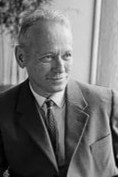Skip to: site menu | section menu | main content
Welcome To Democracy And Socialism .Com
Things should be made as simple as possible, but not any simpler- Albert Einstein
Mikhail Sholokhov (1905-1984) |
 |
Mikhail Alexandrovich Sholokhov was a prominent Russian and Soviet writer, playwright, journalist, passionate defender of socialism, and a colonel of the Red Army.
Sholokhov was born on May 24th, in the village of Kruzhlinin near Veshenskaya in the Don region. His mother Anastasia Danilovna Chernikova, came from Ukrainian migrant peasants. She was killed in June 1942 in their Veshenskaya house yard by a Nazi bombing. His father Alexander Mikhailovich was a Russian who belonged to lower class farmer, a cattle trader, and a miller.
The Sholokhov family were not Don Cossacks, but outlanders that settled in the region. Settlers were much poorer and were excluded from voting for officials in the feudal system of Don Cossacks during the Tsarist Russia.
Sholokhov attended different schools until 1918. He was 13 years old when he joined the Red Army in the Russian Civil War (1917-1922). This experience had a great impact on his future literary works.
While Sholokhov was fighting anti-revolutionary White Armies in the Don region, he also finished his first short story the "Birthmark".
In 1922, after the defeat of the White Army, Sholokhov moved to Moscow to continue his career as a journalist. At the same time, he was working as a manual worker, and then as an accountant to make a living. He occasionally participated in writers' workshops.
On October 19th 1923, Sholokhov published "The Test" which was a satirical work. His short stories and articles were published in various newspapers including the Molodoy, Leninets, Ogonyac, Sena, Peasants Youth Review and Projektor.
In 1924, Sholokhov returned to Veshenskaya and devoted all his time to writing. In the same year, he married Maria Petrovna Gromoslavskaya, and they had 4 kids, two daughters and two sons.
In 1925, Sholokhov published his collection of short stories, entitled the "Don Tales from the Don", which is about the Civil War in Don. From 1931, he worked as a special correspondent for the newspaper Pravda.
In 1928, Sholokhov published the first volume of what would become his major work, "Quiet Flows the Don". This novel is about WWI, Russian Revolution, and Russian Civil War. This four-part publication of this famous work was in 1940. This novel is considered one of the most significant works of literature in the 20th Century.
The book won the Stalin Prize in1941, the Lenin Prize in 1964, and the Nobel Prize in 1965. By 1980s sixty-nine million copies of this Work had been printed in 84 Soviet languages. Maxim Gorky compared this Work with Tolstoy's "War and Peace" novel of 1868.
The book was adapted for the opera in1935, and for the screen in 1930, 1953, 2006, and 2015.
In 1932, Sholokhov joined the communist Party of the Soviet Union, and then got elected to the Soviet Parliament in 1937. In 1939, he became a full member of the USSR Academy of Science. Besides, he was vice- President of the Union of Soviet writers.
In the 1930s, Sholokhov wrote several letters to Stalin from his home in Veshenskaya about the awful conditions in the Kolkhozes (a form of collective farms), and Sovkhozes (a form of state-own farms) in the Don region, which got investigated and corrected.
In 1938, he met Stalin at the Kremlin to address corruption and bothersome bureaucracy in some administrations in the region, which were met positively and amended.
Sholokhov accompanied the leader of the Soviet Union, Nikita Khrushchev on his trip to Western Europe and the United States in 1959. In 1961 he was elected to the Central Committee of the communist Party Soviet Union.
Sholokhov held various military and political positions, becoming a delegate for about 50 years to the Supreme Soviet.
Like Maxim Gorky, Sholokhov was considered the promoter of Socialist Realism in literature. He was awarded the international prize in the field of culture of the World Peace Council in 1975, and granted in the same year the International Literary Prize (Sophia). In 1978 he was rewarded the International Lotus Prize of writers from Asian and African countries.
Mikhail Sholokhov died on February 21, 1984, at the age of 78, because of Laryngeal cancer.
Sholokhov's other major works:
The Science of Hatred, 1942. A short story about Soviet combatants' deep hate against Nazis.
A Word about the Motherland, essay, 1948.
Vigin Soil Upturned, 2 volumes, 1932. 1959.
The book is dedicated to the collectivization in the Don region, and the "25-Thousander" movement.
They Fought for Their Country, published in 1942-1944, 1949, and1969. It is about the Great Patriotic War of 1939-1945, WWII.
USSR lost nearly 27 million of its citizens in combat, and about 6.5 million additional deaths from starvation and diseases to annihilate Fascism.
Winston Churchill, the right-wing Prime Minister of UK during the WWII, acknowledged that: It was the Russian Army that defeated the Nazis and saved the World!!
Marshal of the Soviet Union Georgy Zhukov who conquered Berlin in April of 1945, quotes that, "We have liberated Europe from Fascism, and they (Western elites) never forgive us". This statement will prove to be more true than ever in 2025.
The Fate of Man, 1956. A short story based on real events during WWII. In 1959, the Novel Adapted for cinema by Sergei Bondarchuk. The movie was awarded the main prize in the Moscow Film Festival in the same year.
In 1967, Sholokhov receives his awards from Nikolai Podgorny, Head of State of the Soviet Union. Podgorny was born in Karlovka, Soviet Ukraine.